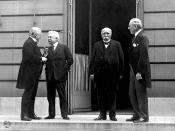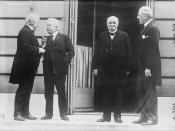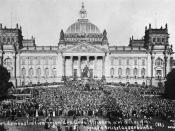By 1918 Germany was being defeated on most fronts and the Russians had negotiated a peace. The German people were hungry, war weary and demanded peace. The German government eventually asked for an armistice, and at the eleventh day of the eleventh month, 1918, a cease-fire began. But still the problem of peace remained. Many people hoped that a peace settlement would prevent war from happening again; President Woodrow Wilson thought that he had the answer to all Europe's problems. He stated his views in "Fourteen Points". In answer to this a conference was held in a Parisian suburb, called Versailles, to discuss the peace. This was the Paris Peace Conference.
The conference was attended by thirty-two states, but four major powers dominated the conference, France represented by Georges "The Tiger" Clemenceau-the French Première, Britain represented by David Lloyd George-the British Prime minister, America represented by Woodrow Wilson-the American President and Italy represented by Vittorio Emmanuel Orlando-the Italian Prime minister.
The above Leaders were considered to be the major powers. This group, 'The Big Four', made major the decisions at the conference and in the drawing up of the treaty.
At the Conference many political conflicts started for example Italy had entered into this war on the side of the allies to gain territory along the Adriatic coast, which was decided upon in a secret treaty with Britain and France, behind Wilson's back. This did not happen at Versailles, as it didn't agree with Wilson's point on national self-determination, as many Croatians, Bosnians and Yugoslavians would be under Italian rule. The area of land Italy was given they believed was pathetically small. This was also the case for Japan, who although not one of the "Big Four" were a strong member of the alliance, came into the war in...


